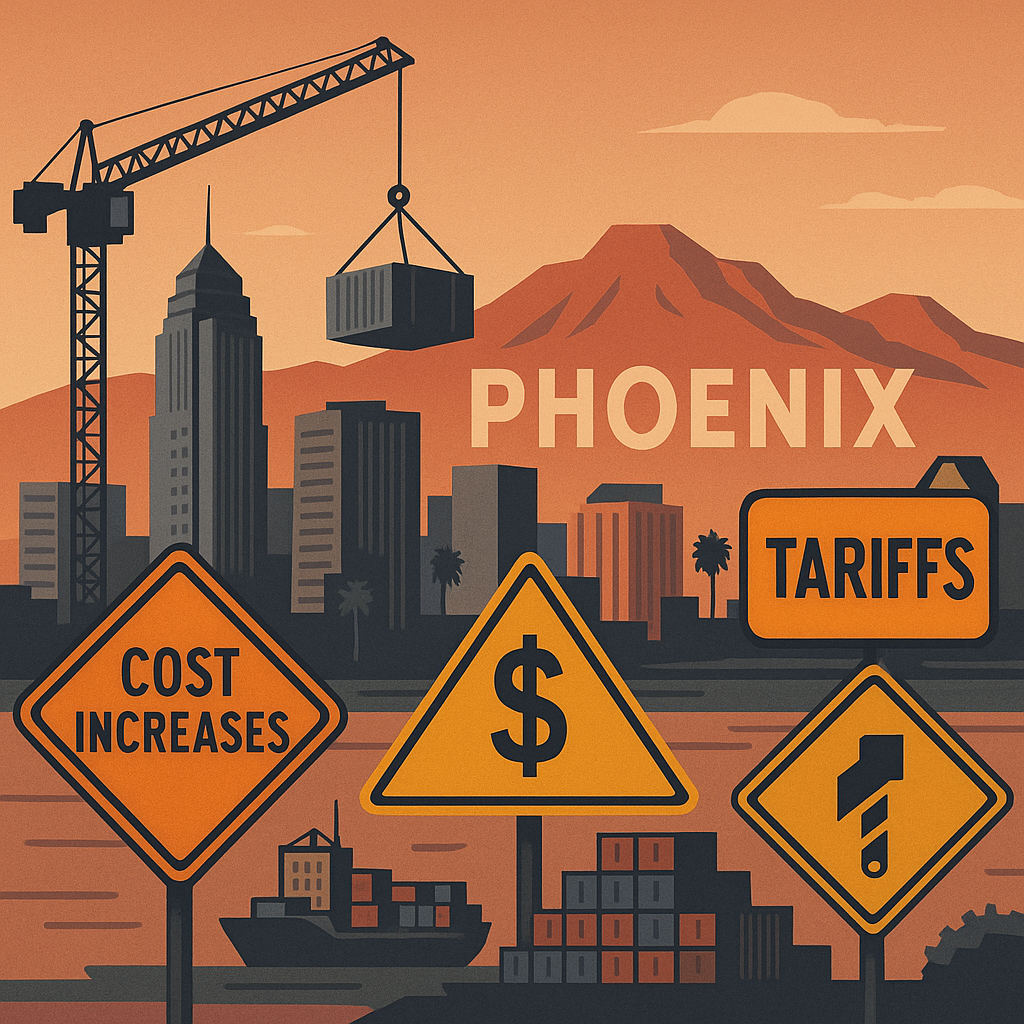How Trump’s Tariffs Could Impact the Phoenix Market
Trump’s proposed return to sweeping tariffs has Phoenix businesses, builders, and farmers watching closely. From housing to agriculture, here’s what’s at stake.
📉 How Trump’s Tariffs Could Impact the Phoenix Market
Former President Donald Trump’s campaign trail rhetoric has once again turned to tariffs—this time with a proposed 10% universal tariff on all imported goods and up to 60% on Chinese products. With the potential return of Trump-era trade policies looming, business owners, economists, and consumers in Phoenix are bracing for ripple effects that could echo through supply chains, housing, and everyday pricing.
Tariffs 101: What’s on the Table?
Trump’s plan includes a broad, across-the-board tariff on all imports, which would function essentially as a tax on foreign goods entering the U.S. The proposal also targets Chinese imports specifically, signaling a possible revival of the U.S.-China trade war seen during his first term. Though the stated goal is to boost American manufacturing, critics argue that such policies inevitably raise costs for U.S. consumers and businesses that rely on global supply chains.
For Phoenix—a metro region heavily dependent on imports for construction, consumer goods, and produce—the implications could be significant.
Construction and Housing: A Squeeze on the Valley’s Boom
Phoenix has consistently ranked among the top cities in the nation for housing development and population growth. However, its construction sector depends heavily on imported materials like steel, lumber, glass, and tile—often sourced from Mexico, Canada, and Asia.
"A 10% or 20% increase in the cost of raw materials could stall new development projects, especially affordable housing builds," says Javier Morales, a Tempe-based general contractor. "We’re already facing tight labor and land costs. Add tariffs to the mix, and something’s gotta give."
That "something" might be price tags. Developers facing higher input costs will likely pass those increases on to homebuyers or slow down their project timelines, exacerbating the region’s housing crunch.
Retail and Everyday Goods: The Cost of Commerce
Will tariffs works?
The question of whether Americans will buy more American products involves various factors, including economic conditions, consumer sentiment, and the influence of marketing and branding.
Recent trends indicate a growing interest in supporting domestic industries, particularly in the wake of supply chain disruptions seen during the pandemic. Many consumers have expressed a desire to bolster the U.S. economy by purchasing locally made goods. However, the decision to buy American often hinges on factors such as price competitiveness, product quality, and availability.
Additionally, cultural movements advocating for sustainable and ethical consumption may boost the appeal of American products, as consumers increasingly prioritize environmental concerns and fair labor practices.
Ultimately, whether Americans buy more American products will depend on a combination of economic incentives, consumer values, and the ability of American manufacturers to meet demand effectively while maintaining quality and affordability.
Small businesses and retailers across Phoenix are voicing concern over rising inventory costs. Products as common as electronics, apparel, kitchenware, and automotive parts could see steep increases in price. Many Phoenix-area businesses, especially in wholesale and e-commerce, rely on bulk imports via the ports of Long Beach and Los Angeles.
Ashley Tran, owner of a home goods store in Tempe, says, "Our suppliers have already warned us about possible increases. If tariffs return, we’re looking at higher prices or thinner margins—probably both."
Big-box retailers may have more flexibility to negotiate pricing with foreign manufacturers or absorb losses temporarily, but small businesses often don’t have the luxury. For consumers, that means paying more at the register.
Agriculture: Arizona’s Unsung Vulnerability
While not as prominent as California, Arizona agriculture plays a key role in the state economy—particularly with lettuce, cotton, and dairy. Export-heavy crops could be impacted by retaliatory tariffs from countries like China, Mexico, and Canada.
"Arizona’s farms depend on global buyers," says Paul Mendoza, an agribusiness consultant based in Pinal County. "If other countries slap retaliatory tariffs on us, local growers lose a chunk of their profit. It hurts us more than it helps."
In Trump’s previous term, the U.S. Department of Agriculture issued over $28 billion in subsidies to offset losses caused by his trade policies. It’s unclear if similar financial relief would be offered a second time around.
Local Manufacturing: Mixed Signals
One silver lining? Phoenix’s burgeoning semiconductor sector and advanced manufacturing base may benefit from protectionist policies. With Intel and TSMC investing heavily in chip fabrication plants in Chandler and north Phoenix, tariffs could shield these firms from foreign competition.
Still, there’s caution. "Our growth depends on global partnerships and international expertise," says Mei Lin, a supply chain analyst at a tech firm in Mesa. "Tariffs might slow down imports of precision tools or affect overseas hiring. It’s never black and white."
Consumer Confidence and Political Climate
Economists at Arizona State University’s W.P. Carey School of Business warn that the psychological impact of tariffs—particularly when paired with inflationary pressure—could reduce consumer confidence. Even if prices rise modestly, the perception of volatility can lead to spending slowdowns.
For a city like Phoenix, whose growth is tied to in-migration, housing affordability, and consumer spending, the stakes are high. "We’re at an inflection point," says economic analyst Rachel Nguyen. "What happens in Washington could define Phoenix’s next decade."
🏀 NBA All-Star Game Coming to Phoenix: What It Means for the Valley
The 2027 NBA All-Star Game is headed to Phoenix—and this time, it’s at the newly renamed PHX Arena. Here’s what the city, fans, and businesses can expect.
New Name, Same Big Stage
The NBA All-Star Game is coming back to the Valley—but with a twist. Phoenix will host the 2027 NBA All-Star Weekend at the newly rebranded PHX Arena. It will mark the fourth time the city has hosted the event, but this edition promises to be the most impactful yet.
The Big Reveal
On March 6, 2024, NBA Commissioner Adam Silver announced the selection of Phoenix as the 2027 host city alongside Suns owner Mat Ishbia and Arizona Governor Katie Hobbs. “Phoenix is ready to show the world the future of basketball, entertainment, and community,” Ishbia said.
With previous All-Star Games held in Phoenix in 1975, 1995, and 2009, the Valley already has a storied history of hosting the league’s biggest weekend. But this time, the stakes are higher. Phoenix has undergone a transformation over the last decade, rapidly becoming one of the most dynamic, fastest-growing cities in America.
The event will be centered at the newly renamed PHX Arena, formerly Footprint Center, which serves as home to the Phoenix Suns, Mercury, and Rattlers. The arena’s rebrand reflects a return to local identity after the naming rights contract with Footprint expired in 2025.
A Booming Downtown and NBA-Ready Energy
Downtown Phoenix’s resurgence will be on full display. The city now boasts high-end hotels like the Kimpton Palomar and the FOUND:RE, top-tier culinary spots like Pizzeria Bianco and Matt’s Big Breakfast, and nightlife destinations stretching from Roosevelt Row to the Warehouse District.
During All-Star Weekend, PHX Arena and the surrounding blocks will be transformed into a sports-and-culture playground. Live broadcasts, sneaker pop-ups, player meet-and-greets, and celebrity-hosted events will flood the area.
"Phoenix is becoming a lifestyle city, not just a stopover," says Keisha Randall, a local entrepreneur and sneaker boutique owner. "This All-Star Game puts us in the same conversation as Chicago, New York, and L.A."
Economic Game Changer
According to city economists and tourism officials, the 2027 NBA All-Star Weekend could inject up to $175 million into the local economy. That includes hotel bookings, restaurant and bar revenue, shopping, transportation, and wages from the thousands of temporary jobs created to support the event.
The Phoenix Convention Center will host the NBA Fan Fest, while Valley Metro is expected to increase light rail frequency to handle the spike in visitors. Security, traffic flow, and city services will receive funding boosts to ensure a safe, seamless experience for both tourists and residents.
Community Engagement & Local Talent
The Suns organization and the NBA plan to collaborate on several community outreach initiatives in the lead-up to 2027, including:
Renovation of local basketball courts
Youth mentorship programs with current and former NBA/WNBA players
Business grants for Black and minority-owned businesses
Art installations and murals from local artists celebrating basketball culture
“We want to leave a legacy,” said Valerie Blackwood, VP of Community Affairs for the Suns. “This isn’t just a game—it’s an opportunity to empower our neighborhoods.”
What to Expect During All-Star Weekend
Though details will be released closer to the date, fans can anticipate a weekend packed with marquee moments:
All-Star Saturday Night: Dunk Contest, 3-Point Shootout, Skills Challenge
Rising Stars Challenge: Showcasing the league’s young talent
NBA Crossover: An interactive experience blending music, fashion, tech, and hoops
Celebrity All-Star Game: Bringing athletes, musicians, and entertainers together
NBA Legends Brunch and Commissioner’s Awards
Surprise pop-ups from brands like Nike, Jordan, Adidas, and local designers
Downtown block parties, after-hours lounges, and private events across the Valley
The PHX Arena Rebrand
The arena rebranding signals more than just a name change. It’s a statement of identity. The decision to revert to PHX Arena honors the city's roots and its rise as a basketball and cultural hub. The arena will undergo tech and hospitality upgrades ahead of 2027, including improved seating, LED enhancements, and an upgraded court-level hospitality suite.
According to Mat Ishbia, the updates are about more than looks. “We’re investing in the fan experience—from the seats to the scoreboard to the soul of the building.”
A Moment That Lasts Beyond the Weekend
Hosting the 2027 NBA All-Star Game isn’t just a win for Phoenix sports. It’s a testament to the city’s growing relevance on the national stage—in sports, business, and lifestyle. For locals, it’s a source of pride. For visitors, it will be a revelation.
As the countdown to tip-off begins, one thing is clear: Phoenix isn’t just hosting All-Star Weekend. It’s owning it.





